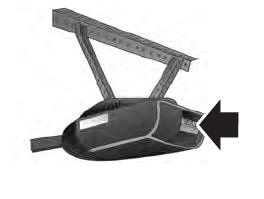Lincoln Nautilus: Climate Control System - General Information / Evaporator Core Leak Check. General Procedures
Lincoln Nautilus 2018-2026 Service Manual / Electrical / Climate Control System / Climate Control System - General Information / Evaporator Core Leak Check. General Procedures
Inspection
-
Recover the refrigerant.
Refer to: Air Conditioning (A/C) System Recovery, Evacuation and Charging (412-00 Climate Control System - General Information, General Procedures).
-
Disconnect the evaporator from the A/C system. Refer to the appropriate
removal and installation section in Group 412 for the procedure.
-
Use the correct adapters with the A/C Service Unit to test the
evaporator. The adapters are part of the A/C flushing kits. For the
correct adapters and A/C Service Unit,
Refer to: Climate Control Tools and Equipment (412-00 Climate Control System - General Information, General Procedures).
-
NOTE: The automatic shut-off valves on some hoses do not open when connected to the fittings. If available, use hoses without shut-off valves. If hoses with shut-off valves are used, make sure the valve opens when attached to the adapter fittings. The test is not valid if the shut-off valve does not open.
Connect the hoses from the A/C Service Unit to the adapter fittings on the evaporator.
-
Open both valves and start the vacuum. Allow the A/C
Service Unit to vacuum for a minimum of 45 minutes after the low
pressure gauge indicates 101 kPa (30 in-Hg). The 45-minute evacuation is
necessary to remove any refrigerant from oil left in the evaporator. If
the refrigerant is not completely removed from the oil, outgassing will
degrade the vacuum and appear as a refrigerant leak.
-
If the low pressure gauge reading will not drop to 101 kPa (30 in-Hg) when the valves are open and the A/C
Service Unit is operating, close the valves and observe the low
pressure reading. If the pressure rises rapidly to zero, a large leak is
indicated. Recheck the adapter fitting connections before installing a
new evaporator.
-
After evacuating for 45 minutes, close the valves and
stop the service unit. Observe the low pressure gauge; it should remain
at the 101 kPa (30 in-Hg) mark.
-
If the low pressure gauge reading rises 34 or more
kPa (10 or more in-Hg) of vacuum from the 101 kPa (30 in-Hg) position in
10 minutes, a leak is indicated.
-
If a very small leak is suspected, wait 30 minutes and observe the vacuum gauge.
-
If a small amount of vacuum is lost, operate the
service unit with the valves open for an additional 30 minutes to remove
any remaining refrigerant from the oil in the evaporator. Then recheck
for loss of vacuum.
-
If a very small leak is suspected, allow the system
to sit overnight with vacuum applied and check for vacuum loss.
-
If the low pressure gauge reading rises 34 or more
kPa (10 or more in-Hg) of vacuum from the 101 kPa (30 in-Hg) position in
10 minutes, a leak is indicated.
-
If the evaporator leaks, as verified by the above
procedure, install a new evaporator. Refer to the appropriate removal
and installation Evaporator procedure in Group 412.
 Electronic Leak Detection. General Procedures
Electronic Leak Detection. General Procedures
Inspection
NOTE:
Depending on refrigerant used:
Use a Rotunda-approved Electronic Leak Detector for R134a refrigerant SAE Certified to J2791...
 Fluorescent Dye Leak Detection. General Procedures
Fluorescent Dye Leak Detection. General Procedures
Leak detection
Review next note for important refrigerant system dye information.
NOTE:
Fluorescent refrigerant system dye is added to the
refrigerant system at the factory to assist in refrigerant system leak
diagnosis using a Rotunda-approved UV
lamp...
Other information:
Lincoln Nautilus 2018-2026 Owners Manual: Fuel and Refueling Precautions
WARNING: Do not overfill the fuel tank. The pressure in an overfilled tank may cause leakage and lead to fuel spray and fire. WARNING: The fuel system may be under pressure. If you hear a hissing sound near the fuel filler inlet, do not refuel until the sound stops...
Lincoln Nautilus 2018-2026 Service Manual: Powertrain/Drivetrain Mount Neutralizing. General Procedures
Adjustment NOTE: Refer to the appropriate section and procedure for special instructions on loosening and tightening mount fasteners. Refer to: Jacking and Lifting - Overview (100-02 Jacking and Lifting, Description and Operation). Loosen, but do not remove, the powertrain/drivetrain mount fasteners...
Categories
- Manuals Home
- 1st Generation Nautilus Owners Manual
- 1st Generation Nautilus Service Manual
- Switching the Lane Keeping System On and Off. Switching the Lane Keeping System Mode
- Opening the Liftgate
- Locating the Pre-Collision Assist Sensors
- New on site
- Most important about car
Programming the Garage Door Opener to Your Garage Door Opener Motor

Copyright © 2026 www.linautilus.com
